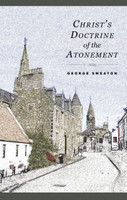
Smeaton, George
Description
George Smeaton was one of the great luminaries in the theological galaxy which graced New College, Edinburgh, in the second half of the nineteenth century. His colleague James MacGregor said that he possessed ‘the best constituted theological intellect in Christendom’. His invaluable study of our Lord’s teaching on the significance of his death gives substance to that claim. In it we find Smeaton’s sensitive theological acumen, his skill in judicious exposition, and his evident devotion to the person of Jesus Christ , all combined in a masterly survey of the Gospel texts which illumine the doctrine of the atonement. The Apostles’ Doctrine of the Atonement, like its companion volume on Christ’s doctrine, is a work to be read and re-read. Those who possess it will often find themselves instinctively turning to consult Smeaton for insight on passages where other works have failed them.
Contents
| 1 | CHAPTER I. |
| THE PREPARATION OF THE APOSTLES, AND THE CIRCLE OF THEIR TESTIMONY, | |
| SECTION I. | |
| The Apostles’ Teaching on the Atonement based on that of the Lord Jesus, | |
| SECTION II. | |
| General View of the Apostles’ Testimony to the Atonement, | |
| SECTION III. | |
| The Apostles’ Exposition of the Sacrifices and Temple Services, as Symbolical and Typical, | |
| SECTION IV. | |
| The Apostles’ References to Prophecy on the Subject of the Atonement, | |
| SECTION V. | |
| The Testimony to the Atonement in the Acts of the Apostles, | |
| SECTION VI. | |
| The Apostolic Epistles, | |
| 2 | CHAPTER II. |
| THE TESTIMONY TO THE ATONEMENT IN THE PAULINE EPISTLES, | |
| SECTION VII. | |
| The Epistles of Paul on the Righteousness of God, | |
| SECTION VIII. | |
| The Reconciliation set forth in the Pauline Epistles, | |
| SECTION IX. | |
| The Testimony in the Epistle to the Romans, | |
| SECTION X. | |
| The Testimony in the First Epistle to the Corinthians, | |
| SECTION XI. | |
| The Second Epistle to the Corinthians, | |
| SECTION XII. | |
| The Epistle to the Galatians, | |
| SECTION XIII. | |
| The Epistle to the Ephesians, | |
| SECTION XIV. | |
| The Epistle to the Philippians, | |
| SECTION XV. | |
| The Epistle to the Colossians, | |
| SECTION XVI. | |
| The Epistles to the Thessalonians, | |
| SECTION XVII. | |
| The Epistles to Timothy, | |
| SECTION XVIII. | |
| The Epistle to Titus, | |
| 3 | CHAPTER III. |
| THE TESTIMONY TO THE ATONEMENT CONTAINED IN THE EPISTLE TO THE HEBREWS, | |
| SECTION XIX. | |
| The Epistle to the Hebrews, | |
| 4 | CHAPTER IV. |
| THE TESTIMONY OF THE APOSTLE PETER, | |
| SECTION XX. | |
| The Epistles of Peter, | |
| 5 | CHAPTER V. |
| THE TESTIMONY OF THE APOSTLE JOHN, | |
| SECTION XXI. | |
| The Epistles of John, | |
| SECTION XXII. | |
| The Testimony of John in the Apocalypse, | |
| APPENDIX. | |
| HISTORICAL SKETCH OF THE DOCTRINE OF THE ATONEMENT, | |
| INDICES. | |
| I. Passages Expounded, | |
| II. Subjects, | |
| III. Greek Words specially noticed, |
Endorsement
‘Smeaton’s book is intimidating to the average believer with its five hundred pages of dense nineteenth-century prose. But it is a valuable book. In fact, it is not an overstatement to say it is a necessary book since it sets before us so clearly and emphatically that our righteousness is to be found only in Christ, not in ourselves.’
–Jerry Bridges
About the Author
George Smeaton (1814–1889) was born in Berwickshire in the south of Scotland, and later studied at the University of Edinburgh. He became the minister of Falkland in 1839. At the Disruption in 1843, Smeaton demitted his charge in the Established Church and later that year became the minister of the Auchterarder congregation of the Free Church of Scotland. In 1853, he took up the Chair of Divinity at the Free Church College in Aberdeen, and in 1857, was transferred to the New College in Edinburgh, where he held the position of Professor of New Testament Exegesis until his death.
Smeaton was held in high regard by his contemporaries—his colleague James Macgregor thought that Smeaton had the best-constituted theological intellect in Christendom, and Dr Alexander Stewart of Edinburgh said that he was ‘perhaps the most learned theologian in the Free Church and a man of deep and unaffected godliness.’